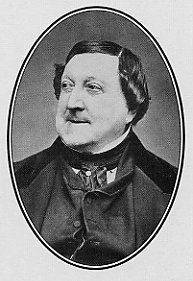|
Makers
Violin History & Timeline
PERFORMERS
Violin
Viola
Cello
Bass
Gamba, etc.
The Roots of Famous Violinists
TEACHERS
Violin
Viola
Cello
Bass
DEALERS
Listings
Specialist
Event
LUTHERIE
Bibliography
Listings
Gallery
COLLECTING
Identification
Buying
Selling
THE INSTRUMENTS
Violin
Viola
Cello
Bass
Viol
Bows
Tales
LINKS
Interesting Sites
GALLERY
Antique Instruments
Historical Photos
|
|
 Rossiniís
comic operatic works won him tremendous acclaim during his lifetime.
Strangely, he ceased writing operas after the age of thirty-seven,
although he lived for another thirty-nine years. The reasons surrounding
his abandonment of operatic composition are still ambiguous. Born in
Italy on February 29, 1792, Rossini was the son of a political rebel
whose republican beliefs often deprived the family of a steady income.
Rossiniís mother and father journeyed to various opera houses, singing
and playing the horn. Thus, Rossini was left with his
grandmother, who was unable to educate or govern a willful, young boy. Rossiniís
comic operatic works won him tremendous acclaim during his lifetime.
Strangely, he ceased writing operas after the age of thirty-seven,
although he lived for another thirty-nine years. The reasons surrounding
his abandonment of operatic composition are still ambiguous. Born in
Italy on February 29, 1792, Rossini was the son of a political rebel
whose republican beliefs often deprived the family of a steady income.
Rossiniís mother and father journeyed to various opera houses, singing
and playing the horn. Thus, Rossini was left with his
grandmother, who was unable to educate or govern a willful, young boy.
In 1804, when his parents finally established a
permanent home, Rossini went to live with them and began his musical
studies. He became a pupil in the Liceo Musicale where he studied music
theory from Mattei, and the cello from Cavedagnia. Although Rossini
rebelled against Matteiís rigid teaching methodology, he excelled as a
student at the Liceo Musicale and was given the honor of writing a
cantata for the school. Financial constraints prevented him from
completing his studies, and he was led to compos e professionally.
Fortuitously, an opera house in Venice was in
immediate need of a single act opera, and asked Rossini to produce one
quickly. Within three days Rossini wrote an operatic piece that was
successful, and that enabled him to attain contracts for more operas.
The first work to receive tremendous appreciation was La Pie tra del
paragone. First shown at La Scala in Milan, the opera was performed
over fifty times during its first season. One year later, in 1813,
Rossini produced Tancredi, his first
serious opera. Its main aria became so popular that the Venetian court
of law had to order citizens to stop constantly humming and whistling
the refrain.
By the young age of twenty-two, Rossini had achieved
great acclaim. A handsome, charismatic individual, he was adored by
audiences. Domenico Barbaja, a wealthy and powerful producer of operas
throughout Milan, Naples, and Vienna, contracted the writing of two
operas a year from Rossini. As the agreement with Barbaja allowed the
composer to produce works for other patrons as well, Rossini was able to
write and sell many operas each year. Generally calm and composed,
Rossini was rarely ruffled by an audienceís
poor reception of his work. He would simply tweak the music and
presentation to produce a show that would soon be received favorably.
Within six years Rossini wrote sixteen operas,
working at a prodigious speed. He married his lover, Isabella Colbran,
in 1822 and spent a great deal of time in Vienna. An elegant host and a
societal success, Rossini even won the adoration of Beethoven. Beethoven
loved Rossiniís work, The Barbar of Seville, and
apparently encouraged the young composer to stick with his talent for
writing operas. When Rossini left Vienna, a farewell concert was
organized on his behalf Numerous singers performed pieces from his
operas, and Rossini himself sang for the audience.
1824 found Rossini in Paris, where he became the
director of the Theatre Italien, and eventually lived out his life.
Charles X established a contract with Rossini, engaging the production
of five operas within ten years. Wi//ian Te/i was
the first work to be written under this contract. Yet, it was Rossiniís
final opera, after which he renounced the production of stage pieces.
Rossini spent the rest of his life writing small
works for the piano. Although he defaulted on his contract with Charles
X, Rossini won a pension that sustained him for the rest of his life. A
year after the death of his first wife, he married his mistress, Qlympe
Pelissier. Rossini and Pelissier became a devoted couple who enjoyed the
pleasures of Paris society. Rossini remained strong and dignified until
the close of his life. He passed away in 1868 after suffering a heart
attack. He is remembered as the genius of comic music.
Note by Shanaira Udwadia (July-2001)
|